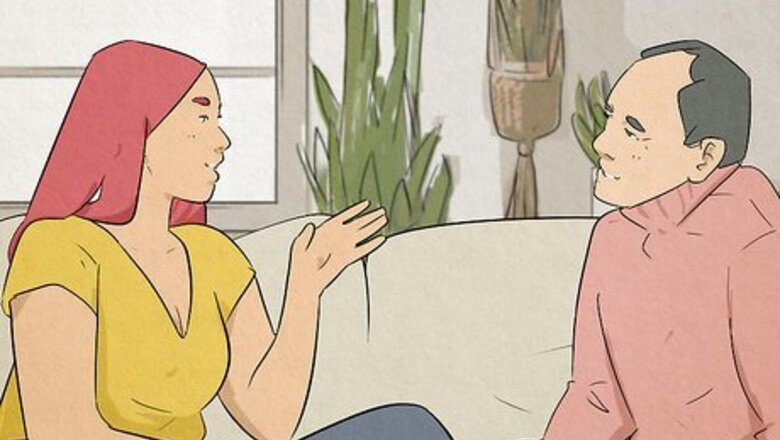
views
Enjoying a Male-Female Friendship

Show you care in non-romantic ways. Be a good friend, but avoid giving him the wrong idea that you care more than you really do. Keep it simple and relaxed. Do things for him that you'd do for any other friend you have. You might try to: Distract him by going out for pizza if he's had a difficult day. Help him move or pack when he needs it. Check-in occasionally to ask how he's doing if you live far away from each other. Help him brainstorm solutions to any problems he's having, like how to deal with a difficult boss or professor. Introduce him to your other friends or people he could date.

Give friendly compliments. Be just as encouraging to your male friend as you would to your female friends. Show your support by smiling at him, giving him pep-talks, and boosting his mood. Avoid complimenting his physical appearance to avoid awkwardness, confusion, or mixed signals. Show your appreciation or gratitude. You could say, "Thank you so much for listening to me about that problem at school. Your point of view was really helpful!" Build up his strength when he is having difficulty. Don't be fake or invalidate his feelings or experience, but do be honest that you think well of him and believe in him. You might say, "I hear that it's tough for you right now. That really sucks. But just know that you're strong and I think you're going to make it through this."

Avoid flirtatious touching. A normal friendship may consist of touching or hugging. But touch can be a powerful way to flirt, so be careful how you touch your friend. You can still give him a goodbye hug or an innocent high five, but avoid sending mixed signals with prolonged or intimate touching. Avoid touching your friend’s arms or face. Avoid lingering hugs with full body contact. Don’t give your friend massages or shoulder rubs. Avoid cuddling or putting your arm around your friend. Realize that some people may be flirty without realizing it.

Set clear boundaries. It will be much easier to maintain a friendship if you have rules. Think of each other more as siblings. Spend time doing activities that are non-romantic in nature. If you're married or dating someone else, avoid sharing secrets or talking about intimate things with this friend that you wouldn’t share with your spouse or partner, too. If you regularly travel with your friend for leisure or work, avoid sharing hotel rooms, sharing romantic meals, and drinking too much alcohol together. If you work with your friend, keep it light while you're at work. Don't seek comfort about issues with your spouse or partner while at work. If you're single, don’t create a "friends with benefits" situation. Sex complicates friendships, particularly if one person is hoping it will turn into a relationship.

Appreciate your friendship. Flirting or developing romantic interest could take away the many benefits the two of you are experiencing in your friendship. Remind yourself that: Your male friend can give you perspectives and insights you might not get from female friends. Your male friend can meet your needs of belonging and connection. Your male friend may provide you the freedom to not talk about feelings as much as you might with your female friends. You may also give your male friend a safer space to share feelings if he wants to.
Addressing Your Friend’s Interest

Talk through each other’s feelings. Hopefully you're in a male-female friendship in which being more than friends isn't an issue, whether because you're just not attracted to each other or because you're in other relationships; however, if it’s not clear to both of you that you’re just friends, you’ll need to directly talk through how each of you sees the relationship. Acknowledge that it’s easy to confuse feelings of being close to and loving a friend with thinking you may be romantically interested. The lines can be easily blurred. Ask him directly how he feels, particularly if you’ve noticed any interest or flirting on his part. You may say, “I really value our friendship and enjoy your company. I only want us to be friends, but I’m worried you’re feeling differently. How do you feel about that?”

Listen to his response. He may not really be interested in you, or he may acknowledge that he has been attracted to you or flirting with you. Whatever his response, listen with respect and empathy. Listening is essential if you want to understand each other and maintain your friendship. Hear his concerns, avoid interrupting him, and try not to judge.

Be clear. If your friend is interested in you, you can let him down easily by acknowledging his feelings, being brief, and being honest. Don't change your feelings just to please him. Acknowledge your friend’s feelings and thank him for being vulnerable. You can say, “It sounds like you’re interested in me and I really appreciate your honesty about that.” Make your point gently and clearly about wanting to stay just friends. You can say, “I like you as a friend and want to keep our friendship the way it is.”

End the conversation on a positive note. Once you've established your feelings, help your friend feel more comfortable. Acknowledge the awkwardness, compliment him, and express hope in the strength of your friendship. You could say, “I know this is awkward, but we’ve been friends for a long time. You’re an awesome guy and I know we’ll bounce back from this.” Keep in mind to give him time if he needs it. If he was truly interested in you, he may need some time and space to process the rejection.
Maintaining the Friendship

Ignore other people. A lot of other people in your life may question your friendship with your friend. You’ll probably get asked if you’re really just friends or get encouragement to flirt with and/or date your friend. Other people may judge you or think that sex will be inevitable between the two of you. Do not entertain rumors from other people. Shut down any questions from people about when you're going to get together or date.

Keep communication open. Be willing to share and listen to your friend. Your male friend may not enjoy the same depth of friendship with his male friends that he does with you. To keep enjoying a good friendship, provide a space in which your friend feels supported, accepted, and respected. Keep being encouraging of your friend.

Acknowledge any sexual tension. Sexual tension is a normal part of male-female friendships, but it isn’t inevitable. Recognize when it’s happening for you and avoid acting on it. Setting good boundaries with your friend can help keep sexual tension at bay. Avoid situations in which you’re inhibited by alcohol with your friend. Pay attention to signals or hints that your male friend wants something more or is waiting for something more. Notice suggestive language, physical contact, and tune into your own comfort level and gut feelings as an internal signal that things are becoming less friendly and more romantic.



















Comments
0 comment